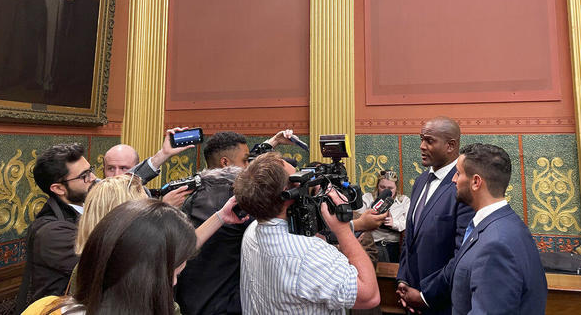Despite Chaotic Presidential Race, New England Elections Are Low-Key, With Only a Few Surprises
So which election were you watching.
With Donald Trump again ushering America onto the political Roller Coaster From Hell, elections across New England yesterday proceeded calmly with few surprises, apart from prodigious turnout.
If voters were angry here, it didn’t show. All the region’s congressional representatives were awarded new terms – all Democrats except for the sole Republican, Sen. Susan Collins of Maine. Both governors who were up for re-election –Republicans both – were handily re-elected. Except in New Hampshire, the upper and lower houses of all six New England states remained relatively stable, with only minor shifts in either direction.
In fact, the region’s biggest political news came from two of its smallest states. In Rhode Island the speaker of the House, Nicholas Mattiello, a Democrat from Cranston, lost his House seat to the Republican mayor’s wife, setting off a leadership battle that will pit House progressives against the remainder of Mattiello’s relatively conservative leadership team. A similar drama played out in northern New England, where Vermont House Speaker Mitzi Johnson is requesting a recount after losing her own seat by 18 votes.
Voters return incumbents to Washington
From the nation’s point of view, the big news of the night was whether Maine Sen. Susan Collins, a moderate Yankee Republican out of synch with her more now socially conservative party, could hold on to win a fifth term against a high-profile and well-funded Democratic opponent.
And she did. Her Democratic opponent, Speaker of the House Sara Gideon, underperformed Democratic standard bearer Joe Biden, allowing Collins to eke out a bare majority of the vote against Gideon and two independents, one (Lisa Savage) on the far left of the political spectrum and the other (Max Linn) on the right. The wildcard in Maine is its system of ranked-choice voting, which progressively redistributes second-choice votes to the leaders until one candidate amasses a majority. Gideon has now conceded, although Collins currently holds a mere 50.2% to 43.1% percent advantage, just barely over the ranked-choice threshold.
Otherwise, the region’s congressional representativ es won their races handily. In Maine, Reps. Chellie Pingree and Jared Golden, a freshman, were comfortably ahead of their Republican rivals in preliminary returns. In New Hampshire, Sen. Jeanne Shaheen and her Democratic House colleagues, Chris Pappas and Annie Kuster, all beat back Republican challengers, while Vermont Rep. Peter Welch polled 67% against Republican Miriam Berry and five independents. Massachusetts Sen. Ed Markey and all eight of that state’s incumbent congressional representatives were returned to Washington; only four had Republican opponents. There they will be joined next year by Jake Auchincloss, the Democratic nominee to succeed Rep. Joseph Kennedy, who earlier this year gave up his House seat for an unsuccessful Senate run against Markey. Sen. Jack Reed of Rhode Island and his two House colleagues, Reps. David Cicilline and Jim Langevin, won their races, as did all five Democratic House members from Connecticut, most notably Rosa DeLauro in Connecticut’s Third District and freshman Jahana Hayes in the Fifth.
With her victory Collins becomes the longest-serving woman in the U.S. Senate.
Governors breeze to re-election
The only New England gubernatorial races were in New Hampshire and Vermont, in which governors serve only two-year terms. Chris Sununu of New Hampshire and Phil Scott of Vermont both were handily re-elected, despite running as Republicans in states that voted heavily for Democratic presidential nominee Joe Biden.
Sununu drew nearly 65% of the vote against both Democrat state Sen. Dan Feltes and a Libertarian candidate. In Vermont, Scott drew an even high percentage in beating off challenges from his Democratic lieutenant governor, David Zuckerman, and six independents.
In the undercard to the Vermont governor’s race, Democrat Molly Gray defeated Republican Scott Milne in the race to succeed Zuckerman as lieutenant governor. Scott largely ignored Zuckerman during his tenure as LG, and Gray likely expects the same treatment. The lieutenant governor’s post, however, is prized as a steppingstone to the governorship.
The Rhode Island House loses its leader
The biggest upset of the night was the defeat of House Speaker Nicholas Mattiello in Rhode Island by Barbara Ann Fenton-Fung, a Republican operative who had never run for office before, but who is married to the popular and term-limited Republican mayor of Cranston, Allan Fung.
Cranston, Rhode Island’s second-largest city, is considerably more conservative than Providence, the state capital, and Mattiello, too, as speaker, has been unusually conservative for a high-profile Democratic Party officeholder. In recent years a growing progressive caucus has challenged his leadership and criticized him for not supporting liberal causes such as abortion rights – creating tension between the politics of the chamber he leads and the district he has represented since 2006.
Compounding his troubles was the criminal case brought against one of his campaign aides, who was charged with felony money-laundering in connection with a hidden contribution to an defeated Republican candidate who had agreed to distribute a mailing promoting Mattiello. The speaker denied any knowledge of the payment, but he was compelled to testify in the case during his campaign for re-election.

Fenton-Fung with her husband, Cranston Mayor Allan Fung
Fenton-Fung ultimately won that race with over 58% of the vote. Mattiello’s loss creates a leadership void in the House that most likely will be filled by House Majority Leader Joseph Shekarchi. However, last week a first-term state representative, Liana Cassar, announced that she would try to marshal progressive support for her own run for speaker, whether Mattiello kept his seat or not.
Meanwhile, Democrats partially compensated for Speaker Mattiello’s loss by capturing the seat of a Republican-turned-independent, Rep. John Lyle, Jr. But Republican former state representative Patricia Morgan in turn defeated incumbent Democratic Rep. James Jackson. A few other races remain undecided.
In any case, the Rhode Island legislature remains almost wholly Democratic – Republicans went into the election with only 5 out of 38 senators and 8 out of 75 reps, and the net pickup of one state rep seat does little to change that math. The real split in both chambers (which is harder to quantify) is between traditional Democrats and the newer “progressive” faction. The progressives made serious inroads in September’s Democratic primary, but for now the odds still seem stacked against both Cassar’s bid in the House and a parallel attempt by Sen. Gayle Goldin’s likely push to oust Senate President Dominick Ruggerio. That picture should become clearer tonight as Democratic members of the House meet in caucus to start selecting next year’s leader.
Vermont’s speaker is also upset, requests a recount

Vermont Speaker of the House Mitzi Johnson
In Grand Isle, Vermont, another House leader appears to have lost her seat, by a far narrower margin. Like many Vermont lawmakers, Speaker of the House Mitzi Johnson serves a district that sends more than one representative to Montpelier. A Republican colleague, Rep. Leland Morgan, represents the same district, and two years ago he enlisted his nephew Michael Morgan to run with him in tandem. Michael Morgan’s 2018 campaign fell short, but this time the Morgan team captured both seats, with Johnson placing third, just 18 votes behind the younger Morgan.
Johnson has already requested a recount. Likely candidates to replace her as speaker could include House Majority Leader Jill Krowinski and Rep. Sarah Copeland-Hanzas, who chairs the House Government Operations Committee.
Vermont’s Progressive Party also lost its House caucus leader in Tuesday’s election. Sally Achey narrowly picked up another seat for Republicans by defeating Rep. Robin Chesnut-Tangerman by 32 votes.
Yesterday’s election also saw the defeat of Rep. Cynthia Browning, who amid the COVID crisis angered colleagues by forcing them to return to the state capitol for a procedural vote. Overall, the GOP picked up three seats, which means that the coalition of Democrats and Progressives are now one seat shy of the 100-vote threshold needed to override vetoes by Republican Gov. Scott. Barring recounts, etc., the new party split in the House finds 92 Democrats, 46 Republicans, 7 Progressives and 5 independents.

Republicans also gained one seat in the Vermont Senate. Incumbent Democrat John Rodgers, who missed a filing deadline and was forced to run instead as an independent, finished last in a five-way race for two Senate seats. The new party breakdown there appears to be 21 Democrats, 7 Republicans and 2 independents.
The New Hampshire legislature flips again?
Over the past 14 years, control of the New Hampshire House of Representatives has flipped five times from one major party to another, and the Senate has changed hands three times. The 400-member House – by far the largest in the nation – is elected from 204 districts; many send more than one representative to the capitol, making for a volatile political situation sensitive to shifting political trends. But the Senate too is unusually volatile as well.
Both chambers switched from Republican to Democratic control after the 2018 election, and both appear to be pivoting back. Republicans appear to have captured 12-14 of the 24 Senate contests, while on the House side the GOP claims a pickup of at least 57 seats, with 5 seats still undecided. At least two close House races are headed to recounts.
The New Hampshire Senate entered the election with a 14-10 Democratic majority in the Senate and a 230-156 Democratic advantage in the House, plus 1 independent.
Other legislatures appear stable
Elsewhere, chambers were more stable. In Maine both parties appear to have flipped one seat each in the state Senate, resulting in no change to the current party breakdown of 22-13. First-term Democratic Rep. Chloe Maxmin of Nobleboro defeated Minority Leader Dana Dow in Senate District 13, while Republican Rep. Trey Stewart looks to have unseated Democratic Sen. Michael Carpenter. The latter race has not yet been called, but Carpenter currently trails by 1,500 votes.
In the House, the GOP defeated at least five incumbent Democrats, including Christina Riley of Livermore and Bettyann Sheats of Auburn. Still, the majority Democrats emerged with at least 80 seats in the 151-member House.
In Massachusetts, the GOP’s tiny 4-member Senate contingent may have been reduced to 3. The Democratic opponent of Republican incumbent Dean Tran is claiming victory, but Tran has not yet conceded the race. The district, which is north of Worcester and borders New Hampshire, was held by a Democrat until Tran flipped it in a 2017 special election. The Republican Senate delegation has fallen to 3 in mid-term before, but the party has never failed to win at last 4 seats in a general election.
In the Massachusetts House, where Democrats enjoy a 127-31-1 edge (with one vacancy), they picked up a seat as a former boxing champion, Kip Diggs, unseated Cape Cod Republican Rep. William Crocker. A Democratic candidate, Adam Scanlon, is also currently leading in the race for the open seat of Republican Rep. Elizabeth Poirier. However, Republicans captured the open seat that John Velis vacated upon winning a special election to the state Senate. In the 7th Hampden race, both the Democratic and Republican candidates claimed victory, before a town clerk admitted that an erroneous count had been released to the Associated Press. In the closest race, Democrat Jake Oliveira narrowly defeated Republican James “Chip” Harrington for the open seat of veteran Rep. Thomas Petrolati. (Harrington has filed for a recount in hopes of erasing Oliveira’s 134-vote margin.)
In any case, Democrats retain supermajorities in both chambers, and most of the new faces in both chambers will be those whose real contest came in the September primaries. Barring recounts, the new Senate breakdown will be 37-3, while the House split will 129 Democrats to 30 Republicans, plus 1 former Republican now serving as an independent.
Finally, in Connecticut the biggest changes next year will owe to retirements. House Speaker Joe Aresimowicz, House Minority Leader Themis Klarides and Senate Republican Leader Len Fasano all decided to step away this year. Meanwhile, Democrats flipped at least one Senate seat and are currently leading in four other races for seats now held by Republicans. Republicans lead in only one race to flip a Democratic seat. In the House, Democrats are said to have picked up at least 7 seats. Democrats now appear to be entering 2021 with a 24-12 supermajority in the Senate and at least a 98-53 edge in the House.
A mixed bag on ballot questions
Rhode Island voters changed their state’s official name. Historically, the state has long been known formally as “the State of Rhode Island and Providence Plantations,” but the word “plantations” has since become associated with chattel slavery.
In Massachusetts, two questions were on the Nov. 3 ballot. Question 1, known as “Right-to-Repair,” aimed to force automakers to allow wider access to cars’ telematics, so that owners could take it to any mechanic. Opponents argued that the proposed changes would make cars less safe, but voters approved the question by a 3-1 margin. This is the second motor vehicle Right to Repair ballot question to pass in Massachusetts, and one where both sides spent the highest amount ever on a ballot question.
Question 2 sought to bring to Massachusetts a form of ranked-choice voting similar to that now used in Maine. Polls suggested the proposal was popular with voters, but they must have had second thoughts, as the measure failed by a vote of 45-55%.
Turnout sets records
Across New England, records were set for both early voting and overall turnout.
In Massachusetts, for example, over 2.5 million voters either voted early or applied to vote by mail. By party, 55.5% of Democrats voted early, as opposed to 37.9% of Republicans and 46.8% of all others. Amid fears of postal slowdowns, 41.2% of all absentee ballots were returned in person.
And, oh yes, there was a presidential contest
Across New England, Democratic candidate and former vice-president Joe Biden won the popular vote in every state, and with it all but one of the region’s 33 electoral votes. With his lead in the Maine’s 2nd Congressional District, President Trump won a single electoral vote awarded by congressional district.
NOTE: This post has been corrected and updated with regard to the disputed contest in Massachusetts between Jake Oliveira and James “Chip” Harrington.


